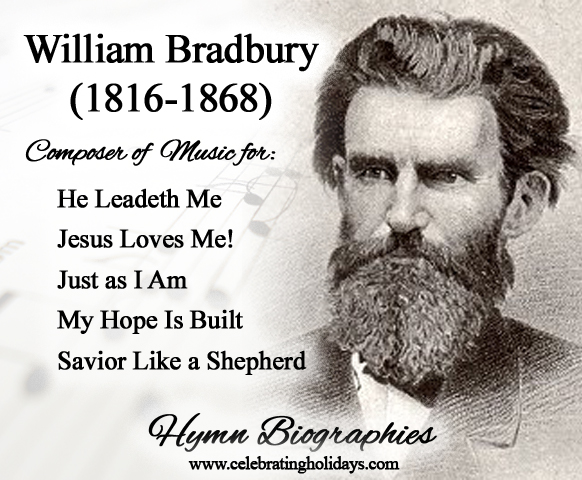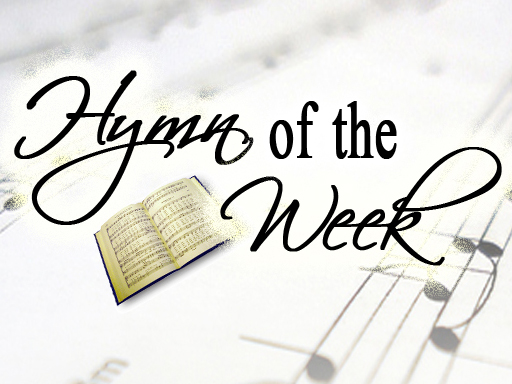Biography of William Bradbury
This page includes a biography of William Bradbury, composer of music for “He Leadeth Me,” “Jesus Loves Me! This I Know,” “Just As I Am,” “My Hope Is Built,” and “Savior, Like A Shepherd Lead Us.”

Biography for William Batchelder Bradbury (1816-1868):
William was born in Maine in 1816. As a child, William spent his days working on the family farm but devoted much of his spare time to studying and practicing whatever music he could find. When his family moved to Boston in 1830, William had the opportunity to attend the Boston Academy of Music where he saw and heard a piano and organ for the first time, as well as other instruments.1 Bradbury immediately began lessons on the organ, and within a year, he had achieved some fame as an organist. Bradbury also attended Dr. Lowell Mason’s singing classes. Lowell, now known as the “father of American church music,” was so impressed with William that he invited him to join his famed choir at Bowdoin Street Church.
When William was 20 years old, Dr. Mason encouraged him to take a teaching job in Maine. William happily accepted this position where he served for over a year. Afterward, he went on to work in various places as a singing teacher and organist. A significant turn in William’s career came when he took a job as the choir director and organist of the Baptist Tabernacle in New York City. William started a singing school for the young that attracted Sunday school directors from all over town. These leaders were so delighted with William’s school that he soon found himself engaged in schools across the city (some had hundreds of kids involved). This began William’s lifelong involvement with the Sunday school movement.
While teaching the children, much to their delight, William would occasionally compose a song for them. In 1841, William began publishing his songs, and his collections sold millions of copies. Eventually, William resigned his position as an organist so that he would have more time for composing and publishing. During the course of his life, William published more than 50 music collections and had the opportunity to mentor famous hymn-writers like Fanny Crosby.2 In 1854, William, along with his brother Edward, even started the successful Bradbury Piano Company. Despite William’s busy schedule, he continued to teach children and advocate for music instruction in the public schools. As a result of his work, William “had the satisfaction of seeing music taught as a regular study in the public schools of New York.”3
In the last two years of his life, William suffered from tuberculosis. A week before his death, the children of his town each brought an oak leaf, which were woven into a wreath and laid on his coffin.4 Bradbury was deeply loved by his community, and his influence extended far beyond his own students and their families. William created a style of Sunday school music that swept the nation. If William’s beloved teacher, Lowell Mason, was known as the “father of American church music,” William had certainly earned the title, “father of American Sunday school music.”
See our Hymn of the Week page for a list of all the hymns available on this site.
This page was created by:

We welcome your ideas! If you have suggestions on how to improve this page, please contact us.
You may freely use this content if you cite the source and/or link back to this page.
Sources:
1 Hall, J. H.. Biographies of Gospel Song and Hymn Writers. Fleming H. Revell Company, 1914.
2 Dowley, Tim. Christian Music, A Global History. Fortress Press, 2011. p.184.
3 Hall, J. H.. Biographies of Gospel Song and Hymn Writers. Fleming H. Revell Company, 1914.
4 HymnTime, “William Bradbury.”






